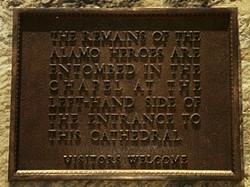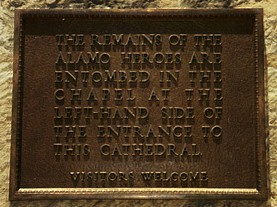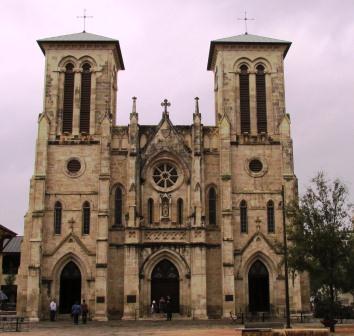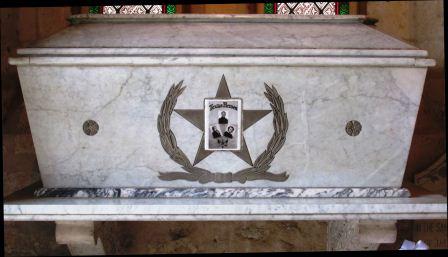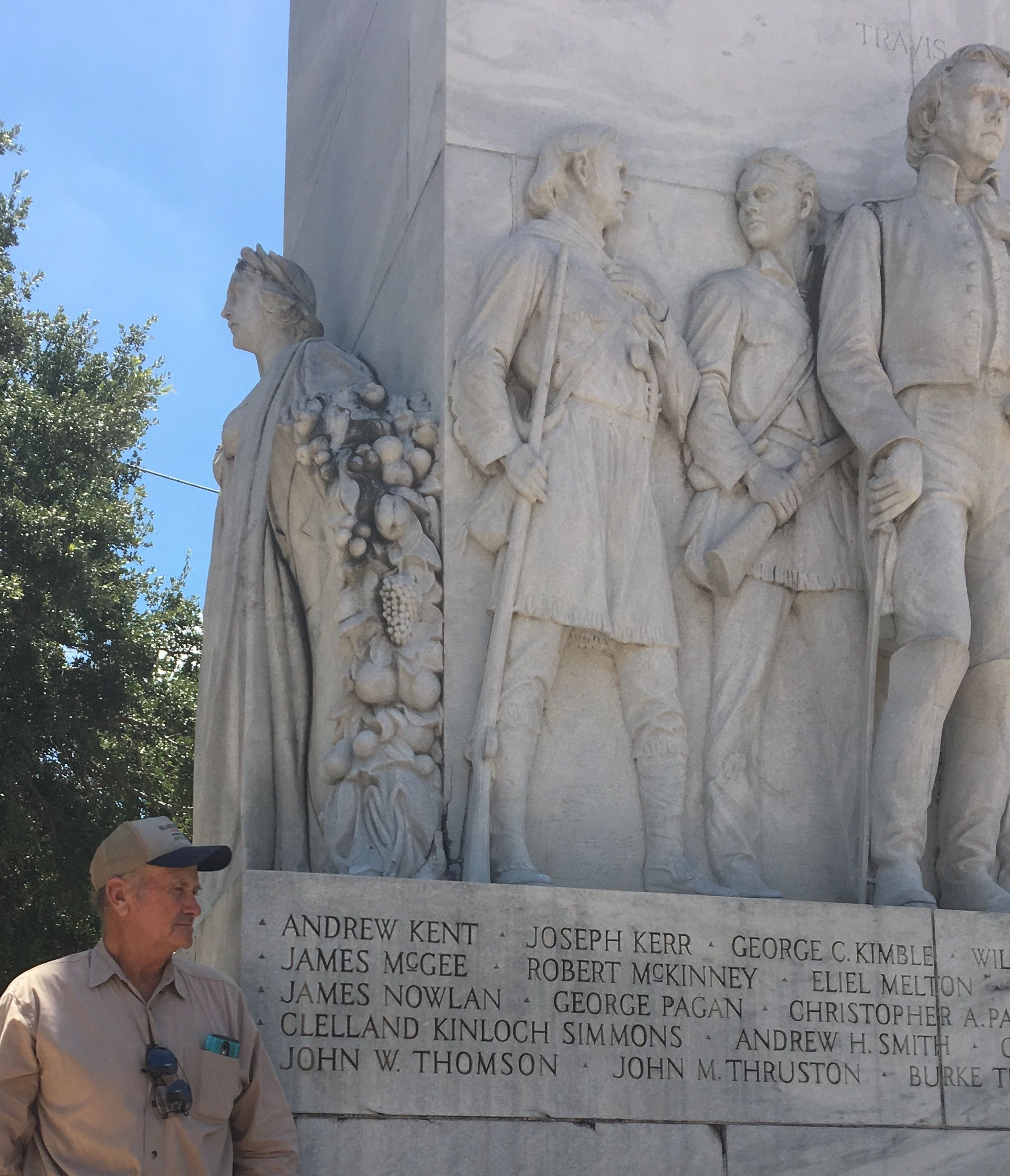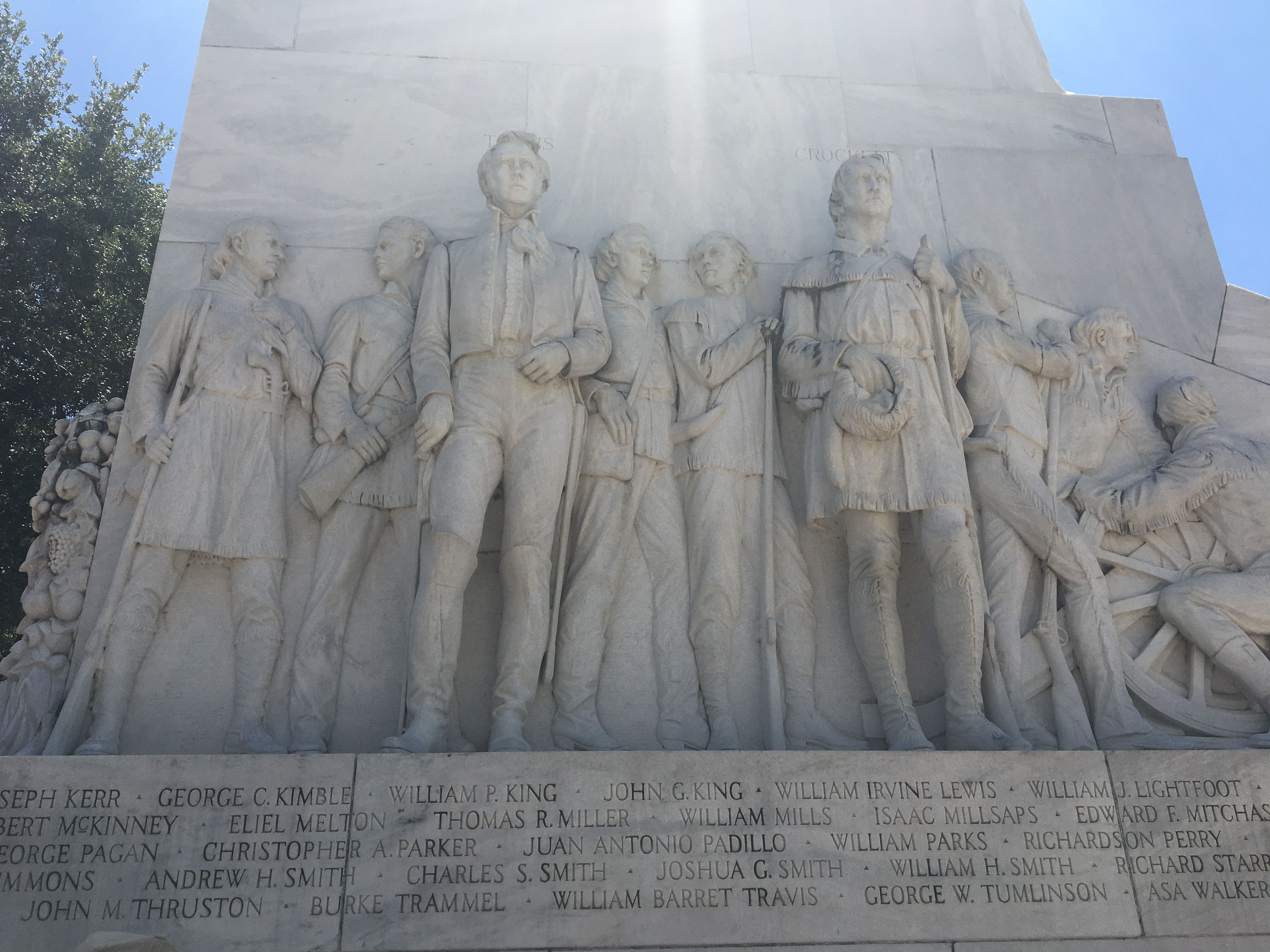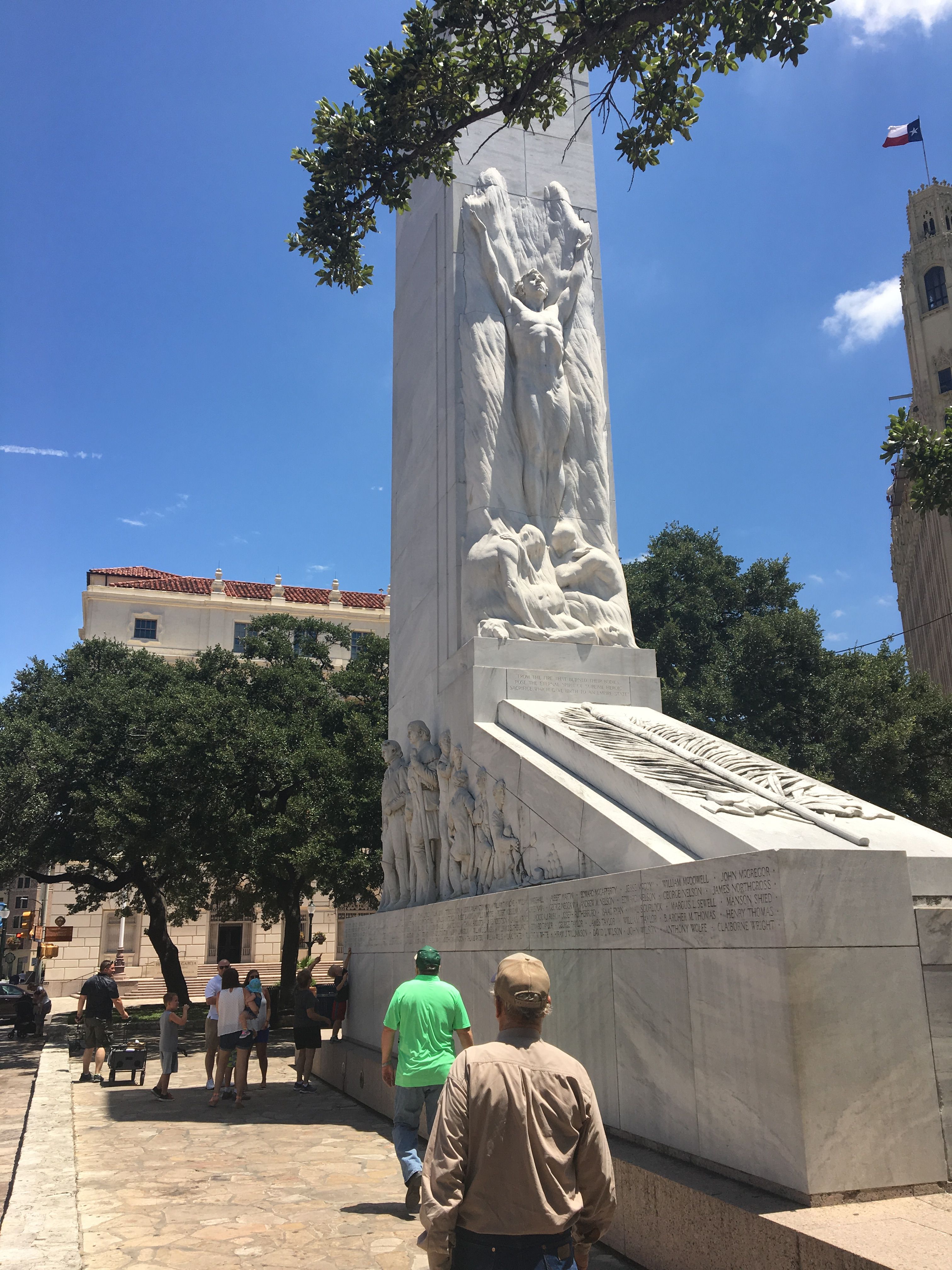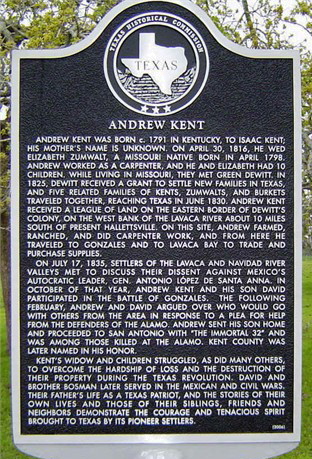*********
On 30 September 1835, Andrew Kent and 18 year old son David Boyd Kent participated in the confrontation with the centralist Mexican Army over the Gonzales cannon on the Guadalupe River outside Gonzales. The confrontation was in protest of the centralist government to disarm and confiscate the weapons of its citizens despite the fact that the government had failed to fulfill its promise to provide protection for their adopted citizens from the depredations of nomadic aborigine bands and other outlaws that prowled the area. On 23 February 1836, Alamo courier Launcelot Smither arrived in Gonzales and announced the arrival of General Cos' army in San Antonio. On the same day Byrd Lockhart completed the muster of the Gonzales Ranging Company of Mounted Volunteers. Andrew Kent was in Gonzales on 21 February where he purchased 19 yards of diverse material (check pants, ankeen and domestic), a pair of shoes, suspenders, crevat and handkerchief on credit for a total of $24.13 at Horace Eggleston's store. He was present at the muster and signed on for himself and son David Boyd Kent. He returned home on the Lavaca River on the same or next day.
On 25 February a messenger carried the news from Gonzales to the Lavaca River residents and informed Andrew Kent at his homestead that the Gonzales Rangers had been called into service and were to meet in Gonzales the next day. After an agonizing night and a morning argument over the safety of the family with his blind wife Mary, who insisted that they could take care of themselves and that he go to relieve the besieged Alamo defenders, Isaac Millsaps left his family and with William E. Summers came by the Kent place early the next day on their way to Gonzales. Burned in 8 year old daughter Mary Ann Kent's memory was the parting moment when the family waved goodbye to the three men, a moment, which she related, many times in later life to any one who would listen. The last words Mary Ann recalled from her father were "This time you may see some blood." Like most of the family men who joined the Gonzales Relief force, the moment was one of particularly intense dilemma and personal conflict for Andrew Kent and the family. His oldest son was to his knowledge under siege within the Alamo garrison and the family on the outside edge of the settled colony was in increasing danger from the increasingly bold Indian raids of which the nearby Hibbins depredation was a fresh example. Although of less intensity, violence from roving bands of predatory outlaws, both from the east and south with allegiance to no principle or government was increasing in probability, not to mention the threat from the centralista army itself should it not be contained at San Antonio. Could wife Elizabeth Zumwalt Kent manage with the nine children, three of whom were under six years without Andrew or eldest son David Boyd?
n San Antonio de Bexar on 24 February 1836, David Boyd Kent and another unidentified young man (possibly Ben Highsmith or A.J. Sowell) were moving a herd of beeves they had rounded from nearby ranches to the Alamo when they were separated from the Alamo garrison by the surrounding centralista forces. Cut off and confused about what to do for more than a day, David Boyd Kent returned to Gonzales. On 26 February, Andrew Kent was both surprised and relieved to meet son David Boyd in Gonzales during the muster and organization of the Gonzales Ranging Company. Andrew and David Boyd argued heatedly over who was to go with the Gonzales Rangers the next day to the Alamo. David Boyd was anxious to again join his comrades from whom he was cut off several days earlier. Because of the increased activity of local bands of Indians, miscellaneous outlaws and deserters from both the Centralist Mexican and Federalist Texan armies, Andrew's primary concerns were the immediate safety of the family as well as the general threat by the centralist Mexican Army in San Antonio. The end result was that father Andrew Kent persuaded son David Boyd Kent to return to the Lavaca River homestead to look after the family and father Andrew joined the main contingent of DeWitt Colony men who departed Gonzales for the Alamo at 2 PM Saturday 27 February 1836. Years later, David Boyd related to relatives that he believed that father Andrew Kent at the time had grave doubts about the chances for success of the relief mission. He related that his father's primary motive was to spare his son and to protect the family, therefore, he insisted that he (Andrew) be the one member of the family to fulfill obligations to the call-up of the Rangers and defense of the Alamo. David expressed regret during his life that he had conceded to his father's wishes and that it was not him instead who had returned to duty at the Alamo and that father Andrew had returned to the family and homestead on the Lavaca.
On 29 February 1836, following instructions from father Andrew, David Boyd Kent directed the scattering of the Kent cattle herd on the open range, burying of valuables and generally securing anything of value and too heavy to hide or carry by looting Indians, outlaws, or the invading regular Mexican Army. The family then moved into Gonzales where they stayed with cousin "Red" Adam Zumwalt's family who ran a boarding house and kitchen. Gonzales town was bustling with families, who like the Kents, had come into town for security from the multiple sources of impending danger. On 6 March 1836 about 3:00 AM, Andrew Kent's daughter Mary Ann Kent related that the sound of distant cannons woke the family. Lying on pallets spread on the floor of the Zumwalt residence, the children could hear and feel the boom of the cannons as they fired 70 miles away in San Antonio. By daybreak there was silence which continued past noon and then sundown and the next day and the next. Travis had sent word to Gonzales that he would fire three daily "all's well" volleys from the walls of the garrison as long as it was in Texan hands. For over six days the people of Gonzales and riders that ventured close to San Antonio to try to hear the three times per day volleys heard nothing. Anxiety mounted and the worst was feared among the residents. There were few that did not have a relative or close friend in the garrison. Source: Used with permission from Andrew Kent-Index
SONS OF DEWITT COLONY TEXAS
Wallace L. McKeehan, All Rights Reserved
*********
On 30 September 1835, Andrew Kent and 18 year old son David Boyd Kent participated in the confrontation with the centralist Mexican Army over the Gonzales cannon on the Guadalupe River outside Gonzales. The confrontation was in protest of the centralist government to disarm and confiscate the weapons of its citizens despite the fact that the government had failed to fulfill its promise to provide protection for their adopted citizens from the depredations of nomadic aborigine bands and other outlaws that prowled the area. On 23 February 1836, Alamo courier Launcelot Smither arrived in Gonzales and announced the arrival of General Cos' army in San Antonio. On the same day Byrd Lockhart completed the muster of the Gonzales Ranging Company of Mounted Volunteers. Andrew Kent was in Gonzales on 21 February where he purchased 19 yards of diverse material (check pants, ankeen and domestic), a pair of shoes, suspenders, crevat and handkerchief on credit for a total of $24.13 at Horace Eggleston's store. He was present at the muster and signed on for himself and son David Boyd Kent. He returned home on the Lavaca River on the same or next day.
On 25 February a messenger carried the news from Gonzales to the Lavaca River residents and informed Andrew Kent at his homestead that the Gonzales Rangers had been called into service and were to meet in Gonzales the next day. After an agonizing night and a morning argument over the safety of the family with his blind wife Mary, who insisted that they could take care of themselves and that he go to relieve the besieged Alamo defenders, Isaac Millsaps left his family and with William E. Summers came by the Kent place early the next day on their way to Gonzales. Burned in 8 year old daughter Mary Ann Kent's memory was the parting moment when the family waved goodbye to the three men, a moment, which she related, many times in later life to any one who would listen. The last words Mary Ann recalled from her father were "This time you may see some blood." Like most of the family men who joined the Gonzales Relief force, the moment was one of particularly intense dilemma and personal conflict for Andrew Kent and the family. His oldest son was to his knowledge under siege within the Alamo garrison and the family on the outside edge of the settled colony was in increasing danger from the increasingly bold Indian raids of which the nearby Hibbins depredation was a fresh example. Although of less intensity, violence from roving bands of predatory outlaws, both from the east and south with allegiance to no principle or government was increasing in probability, not to mention the threat from the centralista army itself should it not be contained at San Antonio. Could wife Elizabeth Zumwalt Kent manage with the nine children, three of whom were under six years without Andrew or eldest son David Boyd?
n San Antonio de Bexar on 24 February 1836, David Boyd Kent and another unidentified young man (possibly Ben Highsmith or A.J. Sowell) were moving a herd of beeves they had rounded from nearby ranches to the Alamo when they were separated from the Alamo garrison by the surrounding centralista forces. Cut off and confused about what to do for more than a day, David Boyd Kent returned to Gonzales. On 26 February, Andrew Kent was both surprised and relieved to meet son David Boyd in Gonzales during the muster and organization of the Gonzales Ranging Company. Andrew and David Boyd argued heatedly over who was to go with the Gonzales Rangers the next day to the Alamo. David Boyd was anxious to again join his comrades from whom he was cut off several days earlier. Because of the increased activity of local bands of Indians, miscellaneous outlaws and deserters from both the Centralist Mexican and Federalist Texan armies, Andrew's primary concerns were the immediate safety of the family as well as the general threat by the centralist Mexican Army in San Antonio. The end result was that father Andrew Kent persuaded son David Boyd Kent to return to the Lavaca River homestead to look after the family and father Andrew joined the main contingent of DeWitt Colony men who departed Gonzales for the Alamo at 2 PM Saturday 27 February 1836. Years later, David Boyd related to relatives that he believed that father Andrew Kent at the time had grave doubts about the chances for success of the relief mission. He related that his father's primary motive was to spare his son and to protect the family, therefore, he insisted that he (Andrew) be the one member of the family to fulfill obligations to the call-up of the Rangers and defense of the Alamo. David expressed regret during his life that he had conceded to his father's wishes and that it was not him instead who had returned to duty at the Alamo and that father Andrew had returned to the family and homestead on the Lavaca.
On 29 February 1836, following instructions from father Andrew, David Boyd Kent directed the scattering of the Kent cattle herd on the open range, burying of valuables and generally securing anything of value and too heavy to hide or carry by looting Indians, outlaws, or the invading regular Mexican Army. The family then moved into Gonzales where they stayed with cousin "Red" Adam Zumwalt's family who ran a boarding house and kitchen. Gonzales town was bustling with families, who like the Kents, had come into town for security from the multiple sources of impending danger. On 6 March 1836 about 3:00 AM, Andrew Kent's daughter Mary Ann Kent related that the sound of distant cannons woke the family. Lying on pallets spread on the floor of the Zumwalt residence, the children could hear and feel the boom of the cannons as they fired 70 miles away in San Antonio. By daybreak there was silence which continued past noon and then sundown and the next day and the next. Travis had sent word to Gonzales that he would fire three daily "all's well" volleys from the walls of the garrison as long as it was in Texan hands. For over six days the people of Gonzales and riders that ventured close to San Antonio to try to hear the three times per day volleys heard nothing. Anxiety mounted and the worst was feared among the residents. There were few that did not have a relative or close friend in the garrison. Source: Used with permission from Andrew Kent-Index
SONS OF DEWITT COLONY TEXAS
Wallace L. McKeehan, All Rights Reserved
Bio by: John "J-Cat" Griffith
Family Members
-
John Kent
1794–1871
-
![]()
William Kent
1796–1830
-
![]()
Robert Charles Kent
1801–1875
-
Martha Jane Strain Kent Zumwalt
1801–1865
-
Thomas Kent
1804–1859
-
![]()
Isaac Kent
1806–1867
-
![]()
Elizabeth Kent Gibson
1808–1893
-
![]()
Mary McClure Kent Crow
1810–1901
-
![]()
Louisa Kent Johns
1812–1872
-
![]()
Lewis Dozier Kent
1813–1857
-
Lucinda Kent Zumwalt
1817–1853
Advertisement
Advertisement
